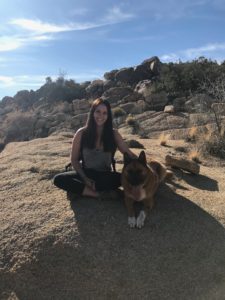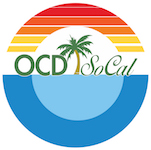My OCD journey  began when I was about 15 years old although I had already been struggling with an eating disorder for about two years. Before OCD, I traveled really often, had a lot of friends and had no issues in school.
began when I was about 15 years old although I had already been struggling with an eating disorder for about two years. Before OCD, I traveled really often, had a lot of friends and had no issues in school.
One day during my junior year of high school, I walked into my first class of the day. The bell hadn’t rung yet so the classroom was mostly empty when I took my seat. A few minutes later, the bell rang and, as my peers started to walk in, I started to feel really anxious, and all these images of myself getting sick in front of the entire class began to flood my mind. I was shaking and I felt nauseous so I went to the bathroom and stayed in there for a few minutes until I calmed down. Once I thought I felt better I went back to class, but the moment I walked in all the same intense images came flooding back, so I grabbed my cellphone and walked outside to call my mom.
My mom took me home, and I spent the rest of the day in bed assuming that I’d feel better the next day. The next morning when I woke up for school the same images were replaying in my mind over and over. Assuming that I was still sick, I stayed home from school, because why else would I be thinking about throwing up? On the third day, I had my mom take me to school, but the moment I got out of the car I started to feel an overwhelming amount of fear, dizziness, nausea, and my thoughts were racing uncontrollably. I literally started running across the football field at school to get to my mom’s car before she got too far from the campus, and I asked her take me home but she decided to take me to the doctor instead.
They did an EKG as well as some other tests but found nothing medically wrong with me, so they sent me home without any answers. Things just continued to spiral from there. I spent weeks attempting to walk into my classes then immediately having to walk out or just having to skip school entirely. I was convinced that I was going to throw up and no one was going to tell me differently.
Within a month, these same thoughts and emotions began happening when I would hang out with friends. I just remember repeating this statement over and over, ” I don’t know what is happening to me but I don’t feel well.” These thoughts and feelings slowly started to attach to most public places as well as most social interactions, but things were still somewhat manageable at this point. I was still able to travel and have friends. Of course back then, I didn’t know that everything I was doing to make myself feel better were the very things that were making me worse.
My compulsions at that time included total avoidance of situations, having to sit nearest to the exit as possible so that I could leave quickly “if I got sick” as well as restricting my food intake even more because my OCD told me that if I didn’t have any food in my system, I was less likely to get sick. Between the years of 2006 and 2009, I saw so many different kinds of providers to try to figure out what was going on but not one person ever said the words anxiety or OCD to me, and I was continuing to isolate.
Between the years of 2009 and 2010, my OCD started to take a major turn in themes. I was still terrified of throwing up in public, and I had become very limited in what I could do or where I could go, but my OCD also started to focus on the fear that I would harm myself or someone else, known as “harm OCD.” These thoughts were so crippling that I became housebound for an entire year and, for the last few months of that year, I could not even be left alone in fear that I would act on these unwanted thoughts. My family and boyfriend at the time had to take shifts staying with me throughout the day and even had to prepare meals for me if it involved using a knife. At this time, I wasn’t telling anyone about the thoughts I was having because, like most people with harm OCD, I was terrified of them and I was even more terrified of what having them meant about me as a person. I didn’t understand why I couldn’t stop thinking these thoughts or why I couldn’t get these horrible images out of my head.
In the beginning of 2011, my mom happened to watch a show on TV that talked about OCD, and she immediately recognized the similarities between what the show was saying and what I had been expressing for years. I started treatment that same week. I cannot put into words how relieved I was when I was finally given a diagnosis, and when I discovered that millions of people struggle with the same thing I do. I knew that the treatment was going to be difficult, but I was ready to claim my life back. I started an intensive outpatient program and a few months later I started attending the weekly support groups at The Gateway Institute.
Once I had really tackled harm and intrusive thought OCD, I experienced a shift in my OCD once again but this time it was to relationship OCD. For me, that looks like worrying about “saying or doing the wrong thing and ruining relationships beyond repair.” Even though this was a new theme that I had to get familiar with, I already had the tools to address the OCD in the correct way by using Exposure and Response Prevention (ERP). Almost six years later, I still attend the groups on a weekly basis because I value the accountability and the support in my ongoing recovery. Some of the closest friendships I have are with members of my support group, and I love being able to encourage them just as much as they encourage me.
Recently, I have returned to school to pursue my Master’s Degree in Psychology to specialize in OCD so that I can continue to use my story to promote hope to those who are still struggling. I am beyond grateful for my recovery because I am able to experience life on my terms rather than on OCD’s terms and because I was able to claim my life back. When you start treatment, you’re often asked to come up with a “why” which is your personal reason for wanting to get better. Your “why” is your source of motivation for when you’re in the thick of battling your OCD and, trust me, having one is really important because there comes a time (or ten) when you will question the treatment, we all do. My “why” was to be able to travel again. Even though I was no longer housebound a few months into treatment, it still took me a long time to get to the point where I could fly to a different country; I eventually did and have several times since. I wholeheartedly believed that I was never going to travel or have any kind of “normal” life again but I do and now I travel as often as I can to make up for all the time I lost. Going through treatment not only gave me my life back, it also taught me a lot about who I am as a person and that my OCD does not define what kind of person I am.
Being an advocate and sharing my story has become my passion. My hope is that after hearing my story you’ll realize that you can overcome OCD, too. It’s okay to be scared, we all were scared, but you’re not alone. If so many of us can do it, so can you, and we’re all here to help one another.
